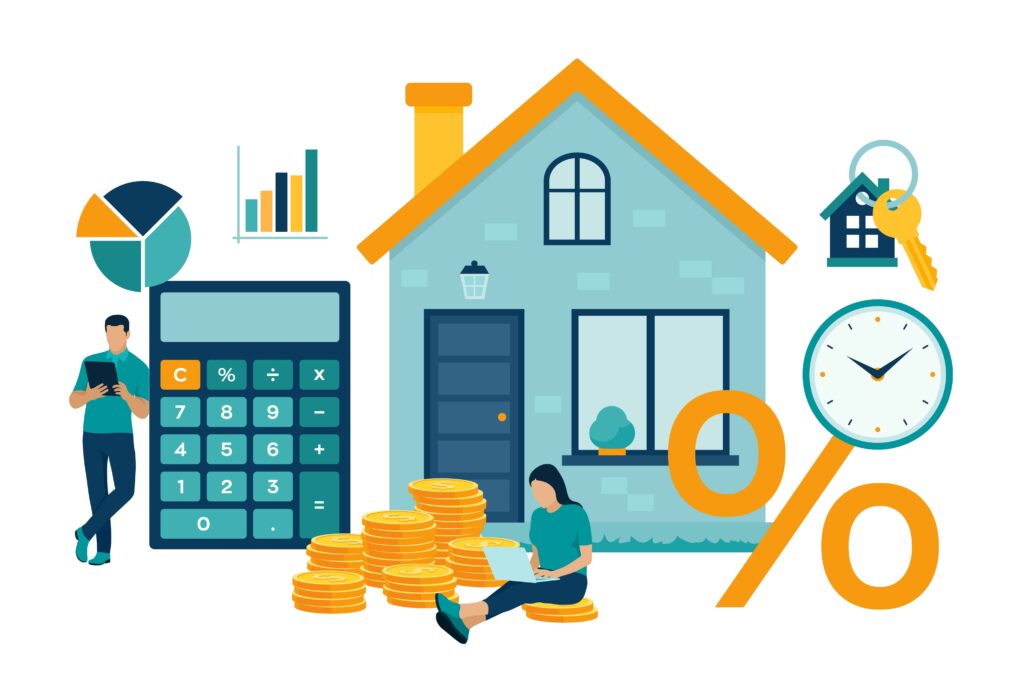When it comes to the many ways you can borrow money, your mortgage might be the most straightforward option. A mortgage loan is essentially an agreement between you and a financial institution where they lend you money and agree to accept payment in the form of interest-only payments over a set period of time, usually 15 to 30 years. When that period ends, your lender will take ownership of your property if you haven’t already paid off the remaining balance at that point.
Do I Need A Mortgage?
A mortgage is a loan typically used to purchase or maintain a home, land, or other real estates. The borrower agrees to pay the lender over time in a series of regular payments that are divided into principal and interest. Then, the property is pledged as collateral for the loan.
Homebuyers apply for a mortgage through their preferred lender and are subject to their lender’s requirements, including credit scores and down payments. Mortgage applications go through a rigorous approval process before they reach the closing phase. A mortgage’s type depends on the borrower’s needs, such as conventional and fixed-rate loans.
Who Can Get A Mortgage
A mortgage is necessary if you cannot pay the full cost of a home or a property out of pocket. Lenders first evaluate your income, debt, credit score, assets, and property type when determining whether you qualify for a mortgage.
In some cases, getting a mortgage on your home or property makes sense, even if you can afford to pay it off if you don’t need the money elsewhere. For example, if you’re an investor, you may look to mortgage properties in order to free up capital for other investments, such as another rental property or stocks, whatever floats your boat.

Loan vs. Mortgage
The word loan can be used to describe any monetary transaction where a person receives a one-time sum of money and then agrees to repay it.
When someone takes out a mortgage, they’re financing their home with a loan. While mortgages are a type of loan, they are not the only type of loan.
Mortgages are secured loans. This means that the borrower agrees to give the lender some sort of collateral if he or she ever stops making payments. Essentially, in the case of a mortgage, the property is used as collateral. If you neglect to make mortgage payments, your lender can claim your home and force you to move out of it; this process is called foreclosure.
The Mortgage Process
In order to obtain a mortgage, prospective borrowers must apply to one or more lenders. The lender will need proof that the borrower can repay the loan. The lender may also require bank and investment statements, recent tax returns, and proof of employment. Credit checks are also usually conducted.
An application must be approved by the lender in order to get a loan. Borrowers must apply for a mortgage before purchasing a property. The pre-approval process allows the borrower to apply for a mortgage while still searching for their new home. Pre-approval for a mortgage may give home buyers an edge in the current market since sellers will know they have the money to cover their purchases.
A buyer and seller determine the terms of their deal, and then their representatives meet at what is called a closing. This is the time when the borrower hands over his or her down payment to the lender. The seller will transfer ownership of the property to the buyer and receive the agreed-upon amount, and the buyer will sign any remaining mortgage documents. A lender may charge fees for originating the loan (frequently in the form of points) at closing.

Lingo & Terms To Know
Now, it’s important to understand some key terms, so you understand what a mortgage entails.
- Loan-to-Value Ratio (LTV): This is the ratio of the amount you borrow against the value of your home. For example, if your home is worth $100,000 and you borrow $80,000, your LTV would be 80%.
- Fixed-Rate Mortgage: This type of mortgage has an interest rate that stays the same for the life of the loan.
- Principal: Generally speaking, a loan’s principal is the amount you have left to pay. For example, if you borrow $500,000 to buy a house and pay off $50,000, your principal is $450,000. Your monthly mortgage payment will automatically be applied to paying down your principal. You may also have the option to make extra payments to your loan’s principal; it is a great way to lower your debt and pay less interest on your loan.
- Interest: Monthly interest on your mortgage payment is determined by the interest rate you are charged and the amount of your mortgage loan. Interest is calculated on your outstanding loan balance and passed on to investors. The more you pay back your loan, the less you’ll owe.
- Down Payment: It is the money you pay upfront to buy a home. In most cases, you must put money down to get a mortgage.
It depends on the loan type, but a larger down payment usually means a better loan and a lower monthly payment. For example, conventional loans allow for down payments as low as 3% in some states. However, you’ll have to pay PMI (Private Mortgage Insurance) to cover the shortfall. You would likely get a better interest rate if you put down 20%, and PMI would not be required.
With a mortgage calculator, you can see how your down payment amount will affect your monthly payments.
- Private Mortgage Insurance (PMI): You’ll need to purchase private mortgage insurance (PMI) to protect your lender in case you default on your conventional loan. For most conventional loans, you’ll need to purchase PMI if your down payment is less than 20%. Typically, when your loan-to-value ratio (LTV) reaches 80%, you can request to stop paying PMI, which means you are free of financial assistance. That is a lender’s way of saying that you have 20% equity in your home.
PMI costs typically range from 0.5 – 1% of the purchase price. PMI can be added to your monthly payments, paid upfront at closing or a combination of the two. In addition, there is lender-paid PMI, which entails a slightly higher interest rate on the loan instead of a monthly fee.
Final Remarks: If You Want To Own Property, You Should Understand How Mortgages Work
Becoming a homeowner isn’t a straightforward task, and it certainly isn’t cheap, but it’s worth the effort. It’s important to take the time to familiarize yourself with mortgages before you enter the market. It would be wise to consult with a real estate lawyer who can help get you started on the mortgage process and help you avoid any potential “landmines.”





